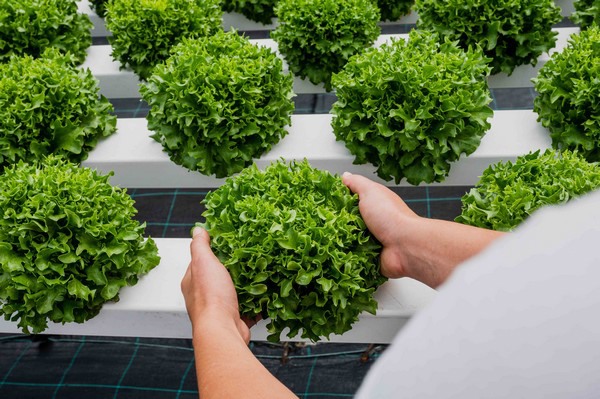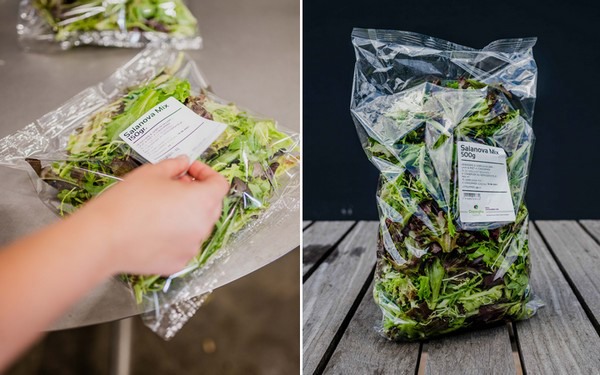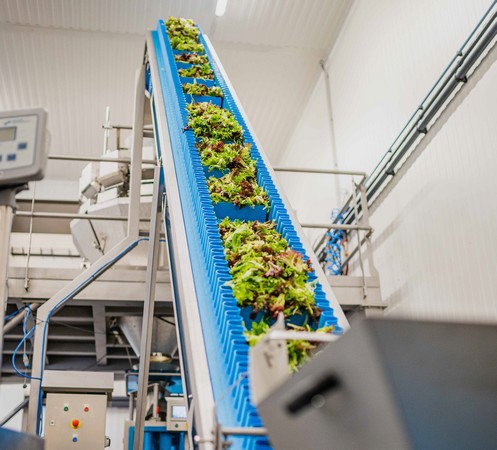It is not easy to bring outdoor lettuce cultivation forward. But, neither is extending its growth in the greenhouse. Therefore, the best thing to do is to switch as smoothly as possible between indoor and outdoor farming. In Belgium, at Dejonghe Salads, that happens in May. Its fresh Salanova lettuce will no longer be grown in the greenhouse but in gutters outside. Doing this hydroponically and outside is something special, as is the company's policy of processing this lettuce manually in its own processing facility.

Earlier this year, Olivier Dejonghe represented Dejonghe Salads at the biennial hospitality and foodservice trade show, Tavola, in Belgium. It was a first for this company. "This fair is vital for us; we have to shine. It's a niche product trade show, where slightly smaller businesses can rub shoulders with the big boys."
Whether Dejonghe Salads is 'big' or 'small' is something Olivier leaves open. "Our processing department has five people, and we have four hectares of land." The fair was held in Kortrijk, putting it right on the company's doorstep. "Most of our customers are in the area, so it was a great opportunity to see them," he says.
Dejonghe Salads sells much of its processed products to hospitality wholesalers. It thus does not have much direct contact with those clients who use that freshly-chopped lettuce. "We often don't know our end customers. We distribute much of our product through wholesalers, who then supply restaurants."
"I met restaurant owners at the trade show, and they, therefore, are aware of me. It helps that our name is on the labels. Buyers converse with me at these events. It's nice to hear how they experience our product and what they want. You get to know what's happening through these conversations," Olivier explains.
Postponed
The company was to have taken part in the fair in 2020 already. "But a week before we were due to attend, COVID-19 hit. So, no trade show." Just like for the hospitality industry, the pandemic was tough on Dejonghe Salads. "We did suffer, yes," Olivier says, understating the fact. "Growing and processing Salanova lettuce is our core business." It is the company's main product, but they cultivate and process other lettuce varieties such as lettuce head and poly lettuce too.
"Most of the Salanova goes to the hospitality industry. It's just not a retail product; don't ask me why. I can't explain it. It's such a beautiful product with a lovely leaf shape and long shelf life. That's an added bonus for the hotel and catering industry. I got positive feedback about that at the fair. The lettuce is robust, too, another advantage. I sometimes think it must be the leaf shape that puts shoppers off, but I can't be sure," Dejonghe confesses.

New partnerships
The pandemic demanded flexibility from many growers, including Dejonghe Salads. "The hospitality industry was closed, so we shifted more towards retailers. We offered our lettuce to local supermarkets, which led to understanding but also partnerships. We still have those, even though the eateries are finally fully open again."
The wholesalers the company supplies tried to find new sales channels too. "Their sales declined too, so they also approached local supermarkets and convenience stores. That led to an increased demand for our small 150g packages. But, our 500g flow packs are the most popular with hospitality buyers. And the 150g packs are more suited to private clients and supermarkets," Olivier continues.

Saved
By now, (almost) all COVID-19 restrictions have been lifted in Belgium. That is good news for restaurateurs and Dejonghe Salads. "The restaurants are busy again. People are making up for lost time there. It's evident that people genuinely missed dining out." Eateries being open over the last two summers 'saved' the lettuce cultivation and processing company, says Olivier.
"We could salvage some of 2020 and 2021, thanks to their summers, even though the weather wasn't great. We sell most of our products to eateries on the coast in the summer." Olivier is a little concerned about the current situation, with its rapidly rising costs and inflation. "I wouldn't call it a crisis, but I do wonder whether people will soon be able to afford eating out as much. But I'm not really worried; I believe particularly the younger generation is eating out more than before."
"I don't think they'll stop easily. At least, I hope not. If people get into true financial difficulty, naturally that behavior can't continue," Olivier says. For now, the hospitality sector's demand grows annually. "That was happening before the pandemic already. You even have to make reservations at Belgian restaurants, and there are plenty of events and parties again. Our product often comes into the picture then."
By hand
The company's well-known Salanova mix consists of five kinds of Salanova, mixed with curly endive. They stumbled upon Salanova lettuce in 2013, and the mix was born. Although the concept remains unchanged, they are not sitting still. "Varieties sometimes disappear, and we're always looking for new varieties to replace existing ones. Leaf shape is important to us, as is the ease of cultivation. The varieties must be easy to grow in a certain period. We have to consider that we grow all year round. We also try to find somewhat heavier varieties."
And, since they process the lettuce, they are always on the lookout for how to process the lettuce well. That is all done by hand. "You can't slice Salanova mechanically," Olivier insists. "Manual lettuce slicing is our strength; it makes a true difference to quality. We don't, and can, compete with the big processors. We represent quality and won't win on quantity. We must distinguish ourselves in other areas. Perhaps we don't make it clear enough that we do all our processing by hand."

Greenhouse
Dejonghe Salads relies on a permanent team to ensure the manual lettuce processing is done right. "We don't have high staff turnover. We put a lot of time and effort into retaining our people. It helps that we can offer year-round employment." Olivier's role in the company focuses on the processing department. He set up this facility in 2012. At that point, his parents, Lieven and Bea, had begun the cultivation company 30 years prior. His brother, Kristof, was with the company for a while and came up with the idea of outdoor hydroponic cultivation.
Olivier's parents currently mainly manage the farm. They grow mostly Salanova in the greenhouse in the winter, while in the summer, they cultivate it outside on water. The greenhouse then holds lettuce heads. This labor division will gradually change soon. "My parents are starting to take things easy. I will take over the farm within five years," says Dejonghe. Will he be twice as busy then? "It will be challenging, but That will be a challenge, but everything works out," he answers, laughing.
The upcoming summer season is the first order of business, followed by the winter crop. "We grow in the greenhouse in the winter. We can also buy overseas products, but the greenhouse still offers a lot of certainty about the harvest. The weather has less of an influence. Our mild winters mean the heating costs aren't too high."
"If everything becomes pricier, we must be able to pass those costs on. I assume these costs, which are now sky-high, will perhaps fall somewhat. But, they won't be what they were before." That, too, is a challenge, but Dejonghe Salads will do everything to make it work. "We still prefer managing locally grown crops," Olivier concludes.
Olivier Dejonghe
Dejonghe Salads
info@dejonghesalads.be
www.dejonghesalads.be
